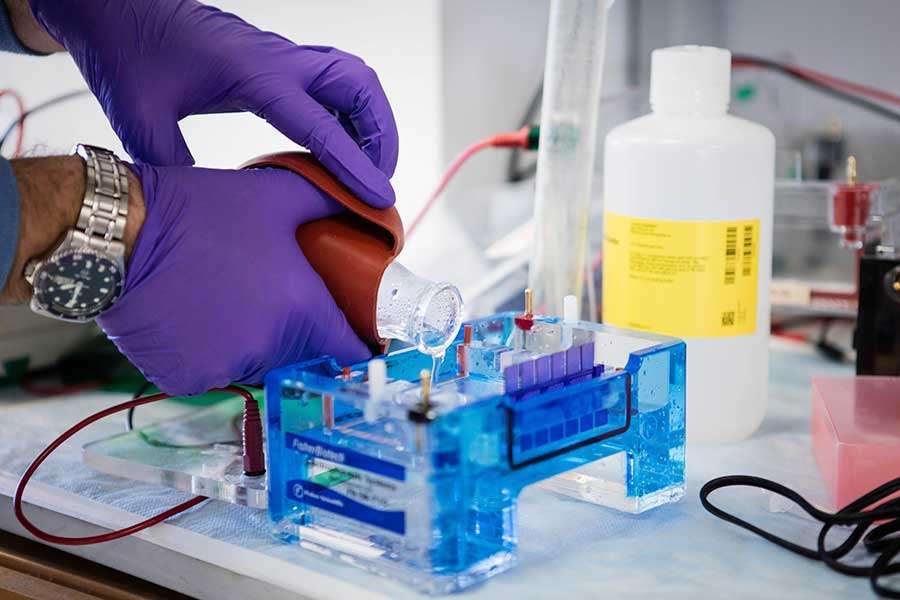
Researchers study genetic links and other risk factors leading to pancreatic cancer diagnoses and strive to detect the disease earlier.
Editor’s note: Today’s edition of the 2018 Year in Review series continues the topic of research. Yesterday’s article covered treatment advancements, and today, we’ll focus on progress in identifying and managing risk, and efforts toward early detection. Stay tuned for recaps of the year’s top stories related to advocacy, national news coverage, volunteer contributions and more.
One of the goals of the Pancreatic Cancer Action Network (PanCAN) is to raise awareness about pancreatic cancer – especially its risk factors and symptoms.
Knowledge about risk factors and symptoms can lead to earlier detection of the disease. Patients whose disease is diagnosed early have the best chance of long-term survival.
Research efforts that began and continued in 2018 aim to develop better early detection tools and to determine the best ways to measure and manage risk.
Progress Toward Identifying and Managing Risk
PanCAN and others have used the following criteria to identify individuals at risk for pancreatic cancer due to family history: two or more first-degree relatives who have had pancreatic cancer, a first-degree relative who developed pancreatic cancer before the age of 50 or an inherited genetic syndrome.

Guidelines are beginning to recommend genetic testing for all pancreatic cancer patients, regardless of family history.
Those who fit these criteria are encouraged to speak with a genetic counselor to determine their risk and eligibility for a screening program.
However, an unexpected discovery this year has blurred some of the distinctions between who may or may not be at risk for developing pancreatic cancer.
Evidence has suggested that people who’ve been diagnosed with pancreatic cancer have a similar rate of germline, or inherited, mutations, whether or not they have a family history of pancreatic or other cancer types.
Based on these and other findings, guidelines are starting to recommend genetic testing for all pancreatic cancer patients, regardless of family history. Family members can then determine whether to undergo testing based on their loved one’s results.
Read more about progress in understanding genetic risk:
- 5 Things to Know About Hereditary Pancreatic Cancer
- New Study Encourages Genetic Testing for All Pancreatic Cancer Patients, Regardless of Family History
- Guidelines Updated to Encourage Genetic Testing
- What You Need to Know About Genetic and Molecular Testing
- How Can Genetic Counselors Help Assess and Manage Risk?
In terms of managing people at risk due to family history or a known genetic syndrome, this year saw one of the longest-standing early detection efforts, the Cancer of the Pancreas Screening (CAPS) project, partially funded by PanCAN, show promising results.
After 16 years of monitoring high-risk individuals through endoscopic ultrasound, the team saw that those (like Steve Nelson) whose pancreatic cancer was diagnosed through the screening effort had earlier-stage disease and better survival, as compared to people who were diagnosed with pancreatic cancer outside the screening program.
In addition to genetics, others may be at risk for pancreatic cancer due to chronic or hereditary pancreatitis (inflammation of the pancreas), a history of smoking, obesity or things outside of their control, like age or race.
Recent research has also identified diabetes as both a risk factor and a symptom of pancreatic cancer. Research efforts, including some funded by PanCAN, are focused on discovering markers to identify diabetes caused by an undiagnosed pancreatic tumor from diabetes that is unrelated to pancreatic cancer.
Progress Toward Early Detection
As mentioned above, data indicate that routine endoscopic ultrasounds can facilitate earlier detection and better outcomes for individuals at high risk for developing pancreatic cancer.

Cancer blood tests, or liquid biopsies, may lead to earlier detection of pancreatic cancer.
However, efforts are underway to seek out early detection strategies that are less invasive and less expensive than imaging. Specifically, many groups of researchers are striving to identify and measure biomarkers, or biological substances, through blood tests (also known as liquid biopsies).
The goal is to find a biomarker (or, more likely, a panel of several biomarkers) that can reliably indicate the presence and severity of disease.
To date, several panels of biomarkers have been found to differentiate blood samples from patients who’ve been diagnosed with various types of cancer, from blood samples of healthy individuals.
The ultimate test will be whether these blood tests can identify the presence of the disease before it’s diagnosed through other means. Several of the studies listed below have moved on to prospective, or forward-looking, analyses to measure their test’s ability to detect pancreatic cancer in its earlier, pre-symptomatic, stages.
Read more about progress in blood tests for early detection:
- Can a Blood Test Lead to Early Detection?
- Researchers Set Sights on New Early Detection Blood Test
- Biomarker Test May Improve Pancreatic Cancer Early Detection
Identifying those at elevated risk and improving early detection strategies have been key priorities for the pancreatic cancer research community this year, highlighted at PanCAN’s annual Scientific Summit and the American Association for Cancer Research’s pancreatic cancer special conference.
And PanCAN continues to invest in innovative research that builds and strengthens the pipeline of investigators focused on the disease, and to learn more about its biological characteristics to devise better ways to prevent, detect and treat pancreatic cancer.





